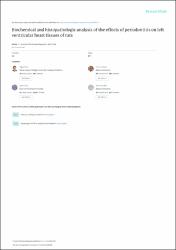Biochemical and histopathologic analysis of the effects of periodontitis on left ventricular heart tissues of rats

Göster/
Erişim
info:eu-repo/semantics/openAccessTarih
2017Yazar
Köse, OğuzArabacı, Taner
Gedikli, Semin
Eminoğlu, Didem Özkal
Kermen, Eda
Kızıldağ, Alper
Kara, Hülya
Özkanlar, Seçkin
Yemenoğlu, Hatice
Üst veri
Tüm öğe kaydını gösterKünye
Köse, O., Arabacı, T., Gedikli, S., Eminoglu, D. Ö., Kermen, E., Kızıldağ, A., Kara, A., Ozkanlar, S., & Yemenoglu, H. (2017). Biochemical and histopathologic analysis of the effects of periodontitis on left ventricular heart tissues of rats. Journal of periodontal research, 52(2), 176–185. https://doi.org/10.1111/jre.12380Özet
Background and ObjectiveCurrent epidemiological works have suggested that chronic infections, such as periodontitis, are associated with an increased risk of cardiovascular diseases, including hypertrophy and heart failure. However, mechanisms behind the association are not known. the aim of this study was to evaluate the effects of periodontitis on the serum lipid levels, inflammatory marker levels and left ventricular heart muscle tissues of rats. Material and MethodsEighteen male Sprague-Dawley rats were randomly divided into two groups: control (without ligature) and experimental periodontitis (EP; ligatured). Periodontitis was induced by placing ligatures (3.0 silk) at a submarginal position of the lower first molar teeth for 5 wk. Serum samples were collected for biochemical studies (C-reactive protein, interleukin-1, tumor necrosis factor- and serum lipids), after which the rats were killed and heart tissue samples were obtained for histopathological and immunological studies (nuclear factor kappa B and -myosin heavy chain). ResultsSignificant increases in C-reactive protein and interleukin-1 levels and no statistically significant increase in tumor necrosis factor- level were observed in the EP group compared to the control group. in addition, total cholesterol, low-density lipoprotein cholesterol and triglyceride levels were significantly higher in the EP group. Stereological and immunological findings showed that the number of nuclear factor kappa B-p65- and -myosin heavy chain-positive cardiomyocytes increased significantly in the left ventricular tissue samples of the rats with periodontitis. ConclusionEarly chronic phase effects of periodontitis on heart tissue are in the form of degenerative and hypotrophic changes. Prolonging the exposure to systemic inflammatory stress may increase the risk of occurrence of hypertrophic changes.

















